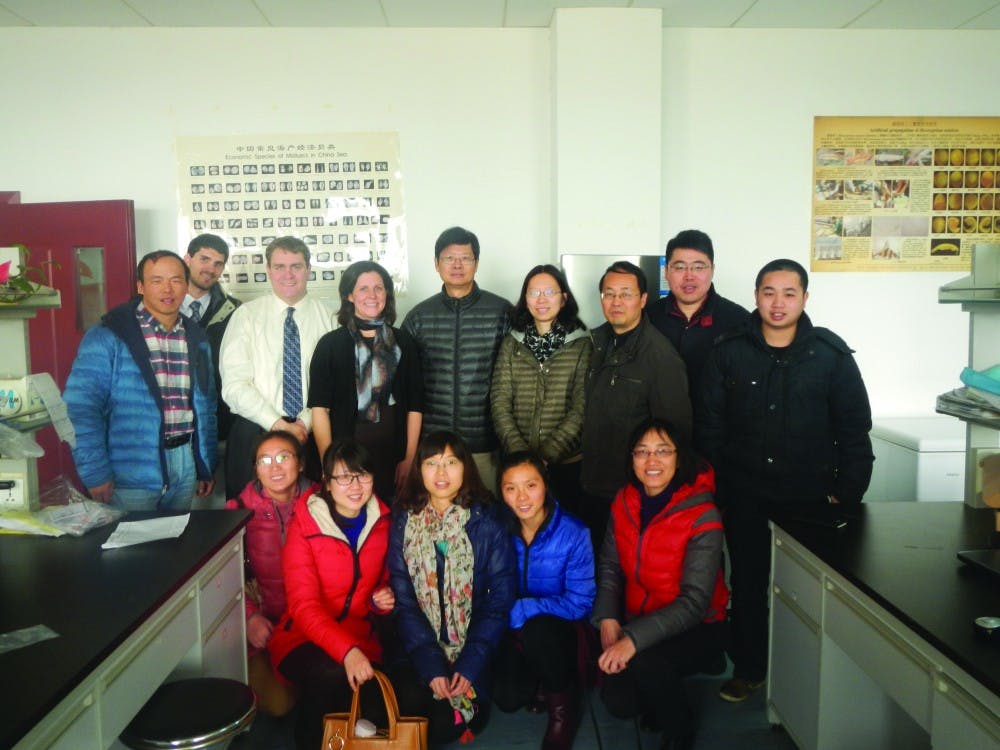Species search
Group researches lake life with Beijing Capital Normal University
Imagine a freshwater lake twice the size of London. It's full of more than 40 species of mollusks, yet the water quality is so poor that researchers can’t even touch it.
Poyang Lake in Jiangxi, China was the destination last month for a research group from Central Michigan University.
The trip was part of an initiative by the Institute for Great Lakes Research and the Chinese reaching out to Central Michigan University for help.
Daelyn Woolnough, assistant biology professor, has been studying mollusks in the Great Lakes and traveled to China to give presentations to Jiangxi Normal University, Nanchang University and Beijing Capital Normal University. Poyang Lake is highly influenced by water levels and extreme levels of nutrients, but is understudied.
That’s where CMU's biology and geography experts come in.
“The neat thing about the presentations was the audience,” Woolnough said. “I was really struck at how interested they were even though their first language is not English. They very interested in our data from the Great Lakes and how that could parallel with the research they are doing there."
Along with the research side of the trip, there were also discussions of academic exchange between the universities. Four students from Nanchang have studied at the Central Michigan Biological Station on Beaver Island and faculty hopes to send graduate students from CMU to China.
“We’ve had a few graduate students come with us on visits but never had a formal exchange with the university,” Woolnough said. “Dr. Xiaoguang Wang who also went to China is working with Dr. Dave Patton to organize a possible study abroad opportunity. There is so much potential for collaboration, it’s very exciting.”
Trevor Hewitt, a graduate student and assistant of Dave Zanatta, associate professor of biology, accompanied faculty on the trip. Hewitt has studied abroad in Costa Rica but had never been to China.
“It was really different being there, but I jumped right into it,” Hewitt said. “I study freshwater ecology and how DNA can be used as a tool in ecology. I was honored to be involved in this research trip and it was really interesting to see all the different and unique species we don’t have here in North America.”
The fieldwork was done in a river that cuts straight through the city. The river has a diversity of native freshwater mussels despite its large nutrient input, and researchers are trying to figure out why that is.
There is also a type of snail in the rivers and lakes that carry a disease called Schistosomiasis, and faculty at CMU may be able to collaborate with faculty at Jiangxi to identify the snails.
Despite research opportunity, no one is able to go into the water without high waders and gloves.
“It challenges us because we can’t just go out and dig for these things,” Woolnough said. “There are a lot of fishermen in the area with very large nets and the neat thing was that they were looking for snails, but with those snails came the possibility of finding the mussels we were trying to identify. It was really cool to be able to work with them and see if they could find anything that was useful to us.”
While the group performed the study, they found a species called “The Golden Mussel." This type of mussel is even smaller than the known Zebra Mussel and gets into smaller crevices.
Along with the Golden Mussel, many species were found that researchers were not familiar with, such as ones with different grooves, patterns and bends.
“The organisms were so unique. It’s amazing how they are related to those in the Great Lakes,” Woolnough said. “They had bumps and curves that I’ve only really seen in pictures or in a museum. Seeing it all was like crossing something off of my biology bucket list.”
Zanatta also studies freshwater mollusks. Although he has been to China before, he went on this trip to work on restoration of the Poyang Lake and collaborate at Nanchang finding new genetic markers for freshwater mollusks.
“The trip was such a unique experience because the language and culture is so different,” Zanatta said. “It’s really exciting that Central is investing in these opportunities and that the faculty at these Chinese universities are interested in working with us because of our knowledge of the Great Lakes."




